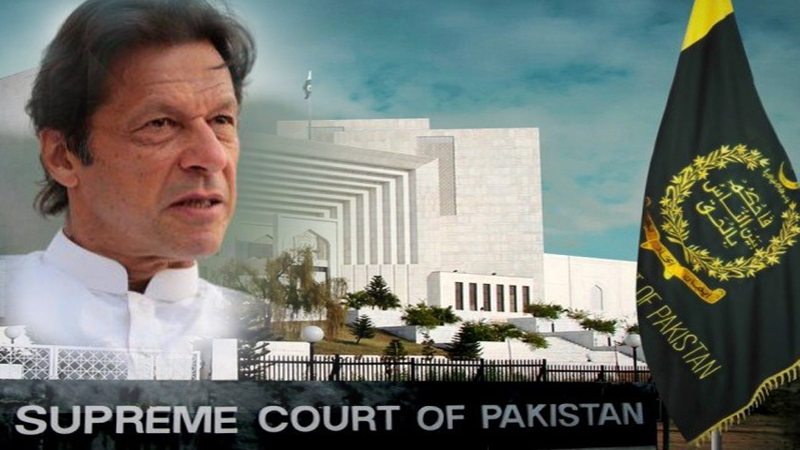 ISLAMABAD: The Supreme Court of Pakistan on Monday rejected the contention of the Pakistan Muslim League-Nawaz (PML-N) leader’s lawyer that the court seemed to be ‘partial’ in the disqualification case against the Pakistan Tehreek-e-Insaf (PTI) chief Imran Khan, by allowing him to submit additional documents, despite the hearing of the case had been concluded.
ISLAMABAD: The Supreme Court of Pakistan on Monday rejected the contention of the Pakistan Muslim League-Nawaz (PML-N) leader’s lawyer that the court seemed to be ‘partial’ in the disqualification case against the Pakistan Tehreek-e-Insaf (PTI) chief Imran Khan, by allowing him to submit additional documents, despite the hearing of the case had been concluded.
A three-member SC bench, comprising Chief Justice Mian Saqib Nisar, Justice Umar Ata Bandial and Justice Faisal Arab, was hearing a petition filed by PML-N leader Hanif Abbassi, seeking disqualification of PTI chairman Imran Khan and secretary general MNA Jahangir Tareen for non-disclosure of their assets, ownership of offshore companies, and PTI being a foreign-aided party.
When the hearing commenced and the court took up Imran Khan’s revised statement seeking amendments to his earlier statement, Akram Sheikh, senior counsel for Abbasi, objected to the plea of amendment, stating that the court had already closed the hearings of the case.
He also argued that there was a perception that the disqualification case against Imran Khan was not being heard in the manner the Panama Papers case was heard.
He said the court’s decision of allowing Imran Khan to submit additional documents even after the conclusion of proceeding was creating such perceptions.
He said the court should not allow the PTI chief to amend his earlier statements, adding that he had filed around a dozen statements having inconsistent stances on different matters along with contradictory documents.
Justice Umar Ata Bandial then observed that the larger bench in the Panama Papers case had repeatedly been asking questions and seeking documents from the Sharif family to establish the money trail of Landon flats, but they failed to satisfy it, thus the matter was referred to the joint investigation team (JIT).
Whereas, Imran Kahn was presenting relevant documents on every question being asked by the court, adding that the court was still trying to establish authenticity of the documents being submitted by him, thus this case had no comparison with the Panama Papers case.
He said Imran was allowed to submit additional documents, just to save the court’s time for further probe into the matter. He said the court was examining whether Mr Khan made a correct statement about the purchase of Bani Gala property.
Akram Sheikh then argued that on the previous hearing of the case. He had requested the court to reserve the verdict as the arguments by all the parties involved in the case, had concluded, however the court had closed the hearings without reserving the verdict.
Naeem Bukhari, counsel for Imran Khan, contended that his client had provided answers to the questions asked by the court through the revised statements, which could not be termed as a “U-turn”.
Akram Sheikh stated that the court could ask questions, but could not allow filing of additional documents, when the hearing had closed. He said the new documents submitted by Khan were insulting.
He contended that Imran Khan had submitted seven written responses to the court in the shape of revised statements, adding that it was his eighth statements in which he had sought another change in his statement.
“The court had left the case open for itself and had asked Naeem Bukhari for additional documents,” the chief justice said. Akram Sheikh then contended that Imran Khan’s plea seeking another change in his stance amounted to contempt.
The chief justice noted that the court wanted to give maximum chance to the parties involved in the case to present their arguments. He said when a case headed to its final conclusion, new things emerge, adding that the court was not holding a trial.
He said the receipts pertaining to money trial of Bani Gala property from Jemima Goldsmith to Imran Khan had been viewed and now it had to be determined whether Imran Khan lied as a parliamentarian or not.
Meanwhile, the chief justice asked Akram Sheikh to present the inconsistencies of Imran Khan before the court. Akram Sheikh then stated that he would submit a written response on the ‘inconsistent’ statements of Imran Khan.
The court then allowed him to submit his written response within a week and adjourned further hearing till today (Tuesday). Today (Tuesday), the court will take up the petition seeking disqualification of Jahangir Tareen.
Published in Daily Times, October 24th 2017.